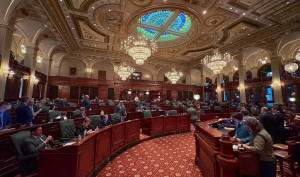Baby food safety, press freedom, public defender measures will head to
governor
[June 05, 2025]
By Ben Szalinski and Jade Aubrey
Gov. JB Pritzker will have hundreds of bills to review after lawmakers
concluded their spring session, including measures protecting press
freedoms and baby food, as well as creating a state public defender’s
office.
Lawmakers voted along party lines Saturday to pass House Bill 3363,
which would create the “Office of State Public Defender” that would
primarily be responsible for providing public defender offices around
the state with more resources.
It also reforms how public defenders would be appointed by requiring a
local nominating committee to appoint or remove public defenders, which
is designed to give the public defenders more independence from the
judiciary.
“Every Illinoisan deserves a strong defense, no matter their income,”
bill sponsor Sen. Robert Peters, D-Chicago, said in a statement.
“Instating this new system would ensure real help reaches people who
have been left behind in conversations about criminal justice reform for
far too long.”
Public defender offices throughout the state have been starved for
resources, with some defense attorneys at public defender offices
handling hundreds of cases at a time. Supporters of the legislation say
the main goal of the office, at least initially, will be to provide more
comprehensive state resources to public defender offices, which now are
typically subject to the limitations of county budgets.
Limited data shows all Illinois counties need more public defenders.
According to an analysis of county public defender budgets compiled by
Northwestern University, no Illinois counties have “sufficient” staffing
in public defender offices.

State lawmakers appropriated $10 million for county public defense
services in the FY26 budget and have appropriated as much each year
since 2023. If signed by the governor, Peters’ legislation won’t fully
take effect until 2027.
Safer baby food
Lawmakers in both chambers unanimously passed Senate Bill 73, which bans
the sale and distribution of baby food in Illinois that contains levels
of toxic elements – including arsenic, cadmium, lead or mercury – that
surpasses the limits set by the U.S. Food and Drug Administration. The
bill now only needs a signature from the governor to become law.
Under SB73, any manufacturer selling baby food in Illinois would be
required to test a sample of their product monthly to ensure the levels
of toxic elements contained in the product fall in line with the limits
set by the FDA. The bill also gives the Illinois Department of Public
Health the right to request and review manufacturers’ testing results
and requires manufacturers to publish the levels of each toxic element
in each of their products on the manufacturer’s website.
Manufacturers who sell products in Illinois would also have to print a
QR code on the label of any baby food that contains toxic elements that
are limited by the FDA. The QR would be required to direct consumers to
the product’s testing information and FDA guidelines on “the health
effects of the toxic element on children.”
[to top of second column]
|

The Illinois House is pictured in the waning hours of the spring
legislative session on Saturday, May 31. (Capitol News Illinois
photo by Jerry Nowicki)

The bill comes after a study published in 2019 by Healthy Babies Bright
Futures, which found that 95% of 168 baby foods tested for toxic
elements contained one or more contaminants. One in four of the baby
foods tested in the study contained all four elements, with arsenic
being found in 73% of the baby foods tested and lead in 94% of the
products.
The study gained public traction after its publication, resulting in the
creation and implementation of “Closer to Zero” – an FDA initiative that
aims to reduce the percentage of toxic metals found in baby food to
zero.
If signed by the governor, the bill will take effect on Jan. 1, 2026.
Press protections
Pritzker will also consider a measure to bolster news media protections
against lawsuits.
Senate Bill 1181 explicitly adds news media as an entity protected under
the state’s Citizen Participation Act, which prohibits “strategic
lawsuits against public participation,” or SLAPPs. It passed the House
75-38 and the Senate 47-10.
It was spurred by a recent state Supreme Court ruling that allowed a
defamation suit filed by a former government employee against the
Chicago Sun-Times to progress.
The Supreme Court’s ruling in that case differentiated “investigative”
reporting from the paper’s coverage of a state inspector general’s
investigation into the Illinois Property Tax Appeals Board’s executive
director.
Lawyers from the Chicago Sun-Times sought to use the Citizen Protection
Act to dismiss the executive director’s 2021 lawsuit against the paper,
which contended it mischaracterized the inspector general’s
investigation.
But the Supreme Court declined, ruling the paper’s coverage lacked any
intent to elicit action or a solution from the government – which was
needed to apply SLAPP protections – because the coverage was not
investigative in nature.
“We are simply holding that the (Citizen Participation) Act specifically
protects government participation and does not encompass all media
reports on matters of public concern,” Justice David K. Overstreet wrote
in the opinion.
SB 1181 directly addresses that sentiment. The bill states, “The press
opining, reporting, or investigating matters of public concern is
participating and communicating with the government,” meaning
organizations doing so would be protected under the law if the bill is
signed. It would apply to actions taken after Jan. 1, 2026.
The measure also provides that all legal proceedings in a case would be
paused while a party’s Citizen Participation Act lawsuit motion
progresses in court.
Capitol News Illinois is
a nonprofit, nonpartisan news service that distributes state government
coverage to hundreds of news outlets statewide. It is funded primarily
by the Illinois Press Foundation and the Robert R. McCormick Foundation.
 |